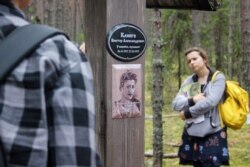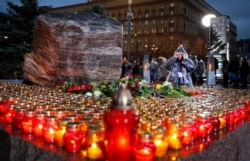A Russian court has sentenced a history researcher to 3.5 years in prison on charges of child abuse — in a closely watched case his supporters say is state retaliation over his research into Stalinist-era atrocities in Russia’s northwest.
Yuri Dmitriev, 64, was convicted Wednesday of “violent acts of a sexual nature” — allegedly for touching his underage foster daughter, according to prosecutors. The court rejected two other charges of illegal weapons possession and child pornography.
Yet Dmitriev has always denied the charges and says they were motivated by shifting state attitudes toward his discovery of the remains of thousands of Soviet-era prisoners during Joseph Stalin’s Great Terror of the 1930s.
The verdict comes after a winding closed three-year court proceeding that saw Dmitriev held in detention throughout — in effect, meaning that despite the sentence, the historian will be freed within months.
Given that prosecutors had been seeking a 15-year sentence, the judge’s decision was met as akin to victory by Dmitriev’s supporters.
“The total lack of grounds for the charges against Dmitriev was clear from the start,” said a statement after the verdict by the human rights group Memorial, where Dmitriev worked and conducted portions of his research.
“And such a lenient sentence on such serious charges can mean only one thing: the prosecution has no proof that Dmitriev is really guilty of forced sexual activity with his underage adopted daughter.”
Acquittals in Russia’s justice system are extremely rare — clocking in at less than 1% of all cases.
Dmitriev’s lawyers say nonetheless they will appeal the conviction.
Troubling discovery
The origins of the case date back to 1997, when Dmitriev and two colleagues discovered a mass grave of some 7,000 remains in Sandarmokh, a remote wooded area in northwest Russia. They had uncovered the remains of Soviet political prisoners executed by Stalin’s secret police at the height of the repressions in 1937-38.
“We were searching for those prisoner remains for 9 years,” says Irina Flige, the head of Memorial in Saint Petersburg, who took part in the expedition in an interview.
The site became an annual point of pilgrimage for surviving relatives scattered across the former Soviet empire.
“We should remember those who perished by the evil will of our government leaders,” said Dmitriev in recalling the finding during his closing statement to the court. “That’s what I consider patriotism.”
Only that view proved increasingly at odds with the modern-day occupants in the Kremlin.
Indeed, the case seemed to unfold against a growing revisionist view of the darker chapters of Soviet history under President Vladimir Putin.
While Soviet ruler Joseph Stalin’s repressions have never been whitewashed completely, Putin’s government has encouraged the violence of the era be ‘balanced’ with the Soviet leader’s positive achievements — such as leading to the USSR to victory over Nazi Germany in World War II.
In recent years, school textbooks have been rewritten and “patriotic” historical groups have emerged to argue against an overly pessimistic view of the Soviet past.
Memorial, a nationwide human rights organization known for its work documenting Soviet-era repressions, was labeled a “foreign agent” beginning in 2012.
In the case of Dmitriev’s discovery at Sandarmokh, the shifting cultural landscape saw pro-Kremlin historical groups insisting the victims’ remains belonged not to Soviet prisoners, but Red Army soldiers killed by Finnish troops in World War II.
The vast majority of historians have cast doubt on those claims, but state media has embraced the story.
“The memory of the terror — it’s not some deep dark past,” Irina Flige of Memorial told VOA.
“The systemic crimes of the Soviet authorities and the systemic crimes of today’s government overlap. Both think they have the right to do with a person however they wish.”
Legal odyssey
Dmitriev’s troubles with the law began in 2016, when authorities charged him with possession of child pornography. Additional charges of nonviolent sexual abuse of a minor and illegal possession of “components of a firearm” were later added, after investigators discovered a half-broken Soviet-era rifle in his home.
He was acquitted of all charges except for illegal weapons possession in 2018 and sentenced to probation.
Only months later, the decision was overturned by the region’s Supreme Court, and new sexual abuse charges were filed based on Dmitriev’s treatment of his underage adopted daughter.
Dmitriev has always denied the charges and says he took photographs of his daughter to document her improving health from malnutrition experienced during early years in a Russian orphanage.
Over time, Dmitriev became a cause celebre within Russia.
In 2019, more than 200 of Russia’s leading artists and musicians issued an appeal to the government to release the historian.
Human Rights Watch also issued a statement in advance of the ruling that cast doubt on sex abuse charges, arguing circumstances “strongly suggest” Dmitriev was being targeted for his human rights work.
Critics also point to the conviction of Sergei Koltyrin, a fellow local Gulag historian and proponent of Dmitriev’s research, on separate child molestation charges in 2019 as being indicative of a pattern of sidelining inconvenient voices with sordid allegations.
Koltyrin, 66, died in prison last April from cancer.
Indeed, Dmitriev seemed to accept that also was to be his fate ahead of the court’s ruling.
“It means my time has come as well,” he wrote to friends in excerpts of letters shared with SeverReal, a partner project of Radio Liberty.
Yet, even with that fate now spared, not all were rejoicing at the outcome of the case.
The novelist Boris Akunin, a longtime supporter, argued that Dmitriev had simply been robbed of years and smeared with spurious charges.
“Everyone’s happy that Yuri (Dmitriev’s) ordeals are near over, and he will be freed … but in my view it just makes the story even worse,” wrote Akunin in a Facebook post.
“The judge knows that this man is innocent and keeps him in prison for no reason by throwing dirt on him.”
Meanwhile, Dmitriev says he intends to continue his research uncovering the crimes of the Soviet regime and reclaiming the historical memory of its victims.
“As long as I have the strength, I will as before work to return to their loved ones the names of parents, grandfathers, and grandmothers,” wrote Dmitriev in a letter to a friend.
“It’s necessary for us — the living,” he added.











